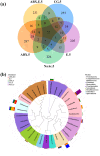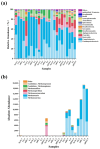Enhancing the Startup Rate of Microbial Methanogenic Systems through the Synergy of β-lactam Antibiotics and Electrolytic Cells
- PMID: 38674678
- PMCID: PMC11051723
- DOI: 10.3390/microorganisms12040734
Enhancing the Startup Rate of Microbial Methanogenic Systems through the Synergy of β-lactam Antibiotics and Electrolytic Cells
Abstract
The slow startup and suboptimal efficiency of microbial carbon sequestration and methane-production systems have not been fully resolved despite their contribution to sustainable energy production and the reduction of greenhouse gas emissions. These systems often grapple with persistent hurdles, including interference from miscellaneous bacteria and the slow enrichment of methanogens. To address these issues, this paper examines the synergistic effect of coupling β-lactam antibiotics with an electrolytic cell on the methanogenic process. The results indicated that β-lactam antibiotics exhibited inhibitory effects on Campylobacteria and Alphaproteobacteria (two types of miscellaneous bacteria), reducing their relative abundance by 53.03% and 87.78%, respectively. Nevertheless, it also resulted in a decrease in hydrogenogens and hindered the CO2 reduction pathway. When coupled with an electrolytic cell, sufficient electrons were supplied for CO2 reduction to compensate for the hydrogen deficiency, effectively mitigating the side effects of antibiotics. Consequently, a substantial improvement in methane production was observed, reaching 0.57 mL·L-1·d-1, exemplifying a remarkable 6.3-fold increase over the control group. This discovery reinforces the efficiency of methanogen enrichment and enhances methane-production levels.
Keywords: PICRUSt2; inhibiting miscellaneous bacteria; microbial community; microbial methanogenic system; rapid start technology.
Conflict of interest statement
The authors declare no conflicts of interest.
Figures







Similar articles
-
Selective evolution of methanogenic communities by β-lactam antibiotics promotes methane production.Microbiol Spectr. 2025 Jun 3;13(6):e0169324. doi: 10.1128/spectrum.01693-24. Epub 2025 Apr 22. Microbiol Spectr. 2025. PMID: 40261017 Free PMC article.
-
Upflow anaerobic sludge blanket reactor--a review.Indian J Environ Health. 2001 Apr;43(2):1-82. Indian J Environ Health. 2001. PMID: 12397675 Review.
-
Targeting Bacteria and Methanogens To Understand the Role of Residual Slurry as an Inoculant in Stored Liquid Dairy Manure.Appl Environ Microbiol. 2018 Mar 19;84(7):e02830-17. doi: 10.1128/AEM.02830-17. Print 2018 Apr 1. Appl Environ Microbiol. 2018. PMID: 29374043 Free PMC article.
-
Sediment Disturbance Negatively Impacts Methanogen Abundance but Has Variable Effects on Total Methane Emissions.Front Microbiol. 2022 Feb 21;13:796018. doi: 10.3389/fmicb.2022.796018. eCollection 2022. Front Microbiol. 2022. PMID: 35265057 Free PMC article.
-
Energy Conservation and Hydrogenase Function in Methanogenic Archaea, in Particular the Genus Methanosarcina.Microbiol Mol Biol Rev. 2019 Sep 18;83(4):e00020-19. doi: 10.1128/MMBR.00020-19. Print 2019 Nov 20. Microbiol Mol Biol Rev. 2019. PMID: 31533962 Free PMC article. Review.
References
-
- Xu W., Cheng H., Li E., Pan Z., Cheng F. Formation of caco3 hollow microspheres in carbonated distiller waste from solvay soda ash plants. Front. Chem. Sci. Eng. 2022;16:1659–1671. doi: 10.1007/s11705-022-2173-z. - DOI
-
- Rosi L., Cenni M., Ciuffi B., Casini D., Rizzo A.M., Chiaramonti D. Enhancing biogas production in anaerobic digestion by the addition of oxidized and non-oxidized biochars. Biomass Convers. Biorefinery. 2024;14:5457–5468. doi: 10.1007/s13399-022-02813-6. - DOI
-
- Łazarski S., Butarewicz A., Cichosz M., Kiełkowska U. Study on the effect of dedicated microelement mixture (dmm) on the kick-off phase of the digester and stabilization of the methane fermentation process. Energies. 2023;16:3763. doi: 10.3390/en16093763. - DOI
-
- Zhang J., Wu S., Xia A., Feng D., Huang Y., Zhu X., Zhu X., Liao Q. Effects of oxytetracycline on mesophilic and thermophilic anaerobic digestion for biogas production from swine manure. Fuel. 2023;344:128054. doi: 10.1016/j.fuel.2023.128054. - DOI
Grants and funding
- 2023YFE0100700/the National Key Research and Development Program - Inter-Governmental International Science and Technology Innovation Cooperation Project
- U20A20149/the National Natural Science Foundation of China
- 202102090301010, YRL-202108/Shanxi Province Key Research and Development Program
- 2023-ZJ-920M/the Qinghai Basic Research Program
- none/the Interdisciplinary Construction Project of Shanxi University
LinkOut - more resources
Full Text Sources

